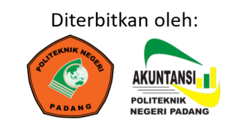Konten Kurikulum Akuntansi Perguruan Tinggi Dan Kesesuaiannya Dengan Standar Kompetensi Lulusan
Abstract
Changing trends in business and finance have an impact on accounting learning and curriculum. This study aims to see how the college accounting curriculum produces competent graduates and their conformity with the IQF competency standards, the competencies needed to prepare graduates to enter the accounting profession and the competencies expected by users (employers). This study uses a mix-method with a sequential exploratory model (content analysis and descriptive statistical analysis). The results of this study show that colleges provide graduates with competencies in accounting, business, general competencies and other competencies that can support graduates' careers. The compatibility between graduates competencies based on the college accounting curriculum and the IQF competency standards has been appropriate, while the compatibility between graduates competencies with the professional organizations competency and user expectations competency has not been appropriate. In their curriculum, some college have included courses related to digital technology. We hoped there will be further harmonization and adjustment between the accounting curriculum and graduate competency standards to improve graduates work ability.References
Adkins, D. A., Geddie, M. F., Moore, P. H., & Griffin, R. B. (2014). Analysis of 2014’s
Thirty Best Undergraduate Accounting Programs. Journal of Academic
Administration in Higher Education, 12(1), 49–60.
AICPA. (2006). Reference guide The AICPA Pre-certification Core Competency
Framework Accounting competencies Business competencies Professional.
https://www.aicpa.org/interestareas/accountingeducation/resources/corecom
petency.html%0A%0A
Andre, S. M., & Smith, B. L. (2014). Enhancing the undergraduate accounting
https://akuntansi.pnp.ac.id/jam
e-ISSN 2657-1080, p-ISSN 1858-3687 189
curriculum to augment core competencies. Advances in Accounting Education:
Teaching and Curriculum Innovations, 15, 59–78. https://doi.org/10.1108/S1085-
Bui, B., & Porter, B. (2010). The expectation-performance gap in accounting
education: An exploratory study. Accounting Education, 19(1–2), 23–50.
https://doi.org/10.1080/09639280902875556
CA ANZ. (2020). The Chartered Accountants Australia and New Zealand Capability
Model. https://www.charteredaccountantsanz.com/learning-andevents/learning/capability-model
CIMA. (2019). CGMA Competency Framework 2019 Update.
https://www.cgma.org/resources/tools/cgma-competency-framework.html
Cobbin, P. E., & Lee, R. E. N. (2002). A Micro-Level Approach to Internationalising
the Accounting Curriculum. Journal of Studies in International Education, 6(1), 59–
https://doi.org/10.1177/1028315302006001005
Creswell, J. W. (2007). Qualitative enquiry & research design, choosing among five
approaches. In Book: Vol. 2nd ed.
Flinders, D. J., & Thornton, S. J. (2004). The Curriculum Studies Reader (2nd ed).
Hasan, S.H. (1988). Evaluasi Kurikulum. Jakarta: Proyek Pengembangan Lembaga
Pendidikan Tenaga Kependidikan
IAESB, I. A. E. S. B. (2017). International Accounting Education Standards Board TM
Handbook of International Education Pronouncements 20s17 Edition.
Institute of Chartered Accountants of England and Wales (ICAEW), Education and
Training Committee. (1996). Added Value Professionals: Chartered Accountants
in England and Wales 2005. London: ICAEW.
Jackson, D. (2009b), “An international profile of industry-relevant competencies
and skill gaps in modern graduates”, International Journal of Management
Education, Vol. 8 No. 1, pp. 29-58.
Lawson, R. A., Blocher, E. J., Brewer, P. C., Cokins, G., Sorensen, J. E., Stout, D. E.,
Sundem, G. L., Wolcott, S. K., & Wouters, M. J. F. (2014). Focusing accounting
curricula on students’ long-run careers: Recommendations for an integrated
competency-based framework for accounting education. Issues in Accounting
Education, 29(2), 295–317. https://doi.org/10.2308/iace-50673
Low, M., Botes, V., Rue, D. Dela, & Allen, J. (2016). Accounting Employers ’
https://akuntansi.pnp.ac.id/jam
e-ISSN 2657-1080, p-ISSN 1858-3687 190
Expectations - The Ideal Accounting Graduates. E-Journal of Business Education &
Scholarship of Teaching, 10(1), 36–57.
Mandilas, A., Kourtidis, D., & Petasakis, Y. (2014). Accounting curriculum and
market needs. Education and Training, 56, 776–794. https://doi.org/10.1108/ET-
-2013-0138
Moore, P. H., & Griffin, R. B. (2017). Evaluation of the 2014 Best Undergraduate
Accounting Programs as Compared to the 2004 Top Undergraduate Accounting
Programs. Journal of Academic Administration in Higher Education, 13(1), 7–18.
http://ezproxy.lib.uconn.edu/login?url=https://search.ebscohost.com/login.asp
x?direct=true&db=eric&AN=EJ1139141&site=ehost-live
Natoli, R., Jackling, B., Kaider, F., & Clark, C. (2013). Mapping WIL activities in the
curriculum to develop graduate capabilities: A case study in accounting. AsiaPacific Journal of Cooperative Education, 14(2), 75–88.
Peraturan Menteri Pendidikan dan Kebudayaan No. 73 Tahun 2013. Penerapan
Kerangka Kualifikasi Nasional Bidang Pendidikan Tinggi. Jakarta
Ramadan, S. (1992). Practitioners view to analyze content level of undergraduate
acc.pdf (p. Vol 8, No. 3, 1992, PP. 9-25).
Sekaran, U., & Bougie, R. (2011). Research Methods for Business: A Skill-Building
Approach, 6th Edition.
Sugiyono. (2013). Metode Penelitian Kuantitatif, Kualitatif, dan R&D. Alfabeta.
Undang-undang No. 20 Tahun 2003. Sistem Pendidikan Nasional. Jakarta










